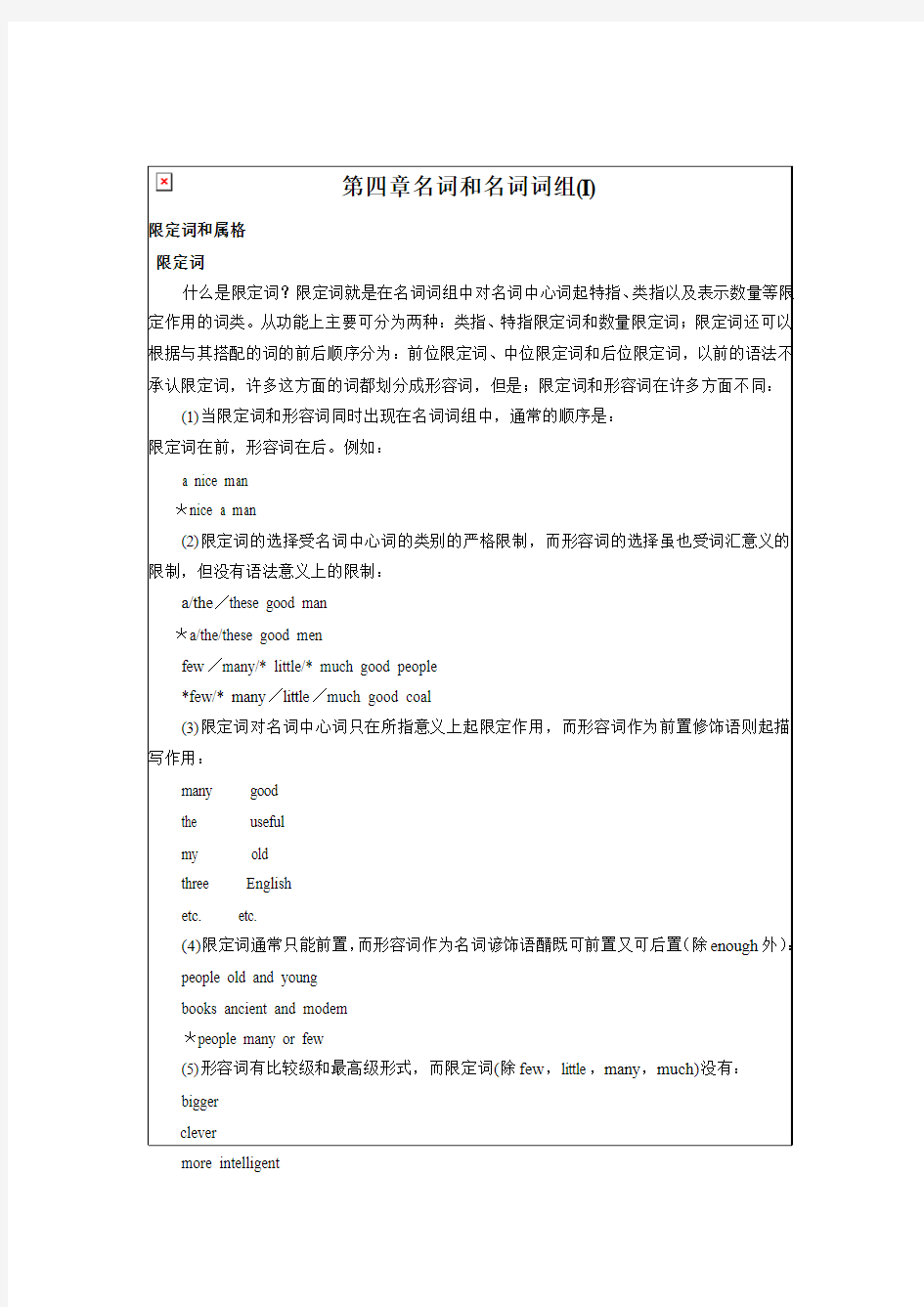《英语语法》第四章 名词和名词词组(I)

- 1、下载文档前请自行甄别文档内容的完整性,平台不提供额外的编辑、内容补充、找答案等附加服务。
- 2、"仅部分预览"的文档,不可在线预览部分如存在完整性等问题,可反馈申请退款(可完整预览的文档不适用该条件!)。
- 3、如文档侵犯您的权益,请联系客服反馈,我们会尽快为您处理(人工客服工作时间:9:00-18:30)。
第四章名词和名词词组(I)
限定词和属格
限定词
什么是限定词?限定词就是在名词词组中对名词中心词起特指、类指以及表示数量等限定作用的词类。从功能上主要可分为两种:类指、特指限定词和数量限定词;限定词还可以根据与其搭配的词的前后顺序分为:前位限定词、中位限定词和后位限定词,以前的语法不承认限定词,许多这方面的词都划分成形容词,但是;限定词和形容词在许多方面不同:
(1)当限定词和形容词同时出现在名词词组中,通常的顺序是:
限定词在前,形容词在后。例如:
a nice man
*nice a man
(2)限定词的选择受名词中心词的类别的严格限制,而形容词的选择虽也受词汇意义的限制,但没有语法意义上的限制:
a/the/these good man
*a/the/these good men
few/many/* little/* much good people
*few/* many/little/much good coal
(3)限定词对名词中心词只在所指意义上起限定作用,而形容词作为前置修饰语则起描写作用:
many good
the useful
my old
three English
etc. etc.
(4)限定词通常只能前置,而形容词作为名词谚饰语醑既可前置又可后置(除enough外):
people old and young
books ancient and modem
*people many or few
(5)形容词有比较级和最高级形式,而限定词(除few,little,many,much)没有:
bigger
clever
more intelligent
more beautiful
③They lost all hope of finding the survivors.他们失去了找到生还者的所有的希望。
④The disease attacked all England.这个病袭击了整个英格兰。
all和whole除在语法上不同外,其他意义近似,如:
①They stayed here all day (=…the whole da y).他们呆在这里一整天。
②All the town were celebrating the victory that night (=the wholetown…).
昨天晚上整个城镇都在欢庆胜利。
但是,它们之间的不同大于近似之处。当形容一个名词的复数时,all指所有成员,相当于every,whole意思为一个整体,因此,有时它们之间不能互换,如下例句:
①She would work tweDe hoursa day all the years when.shewas at Cambridge.
当她在剑桥时的每一年,每天都工作12个小时。
②Whole reg;iments surrendered to the enemy.全团向敌人投降了。
当all修饰一个表示地名的名词时,通常指生活在这个地方的所有的人;whole指这个地方的所有居民或指这个地方,如:
①All the village was excited at the news (=The whole village...)
村上的所有的人都为这个消息而兴奋。
②The whole village was flooded.整个村庄被洪水淹没了。
同时修饰一个表示地方的名词时,还要注意语法上的区别:
①All Newcastle was excited at the news.整个纽卡斯尔城都为这个消息而兴奋。
②*Whole Newcastle was excited at the news.
③*The whole Newcastle was excited at the news.
④The whole of Newcastle was excited at the news.
all和both
both修饰可数名词,指含有两个的一组:
A: Did you see Mary at the party or at themeeting?
你是在晚会上还是在会议上见到玛丽的?
B:I saw her on both occasions.在两个地方都见到她了。
如果一组中有两个以上的,则用all。
all,every和each
all,every和each都可指一组人或东西,但侧重面不同。all指整个一组;every指一组中的每一个成员;each指把一组中成员一个个分开考虑:
①All the boys enjoyed themselves at the party.在晚会上所有的男孩玩的很快乐。
②Every boy enjoyed himself at the party.在晚会上每一个男孩都玩的很快乐。
③Each boy got one present at the party.在晚会上每一个男孩都得到了一份礼物。
both.each和either
both,each和either的意思都是两个或“这个和剩余那个”,在一些上下文中,可以互换:
both sides
There are shops on each side of the street
either side
在街两旁都有商店。
如果指两者中的一个,用each或either。
①She sat watching TV with a child on each/either side of her.
她坐着和她两边的孩子一起看电视。
②There is a chair at each/either end of the long table.在长桌的两边各有一把椅子。
any, either,no (none),neither
any和no(none)(指一组含有两者以上的成员)相当于either和neither(指含有两个成员的一组):
①A: Which (of the two buses) shall I take to the airport?
我应该乘坐这两辆公共汽车中的哪一辆去机场?
B:Y ou can take either one.随便哪一辆都行。
②A:There' re three flights to London,aren't there?有三次去伦敦的航班,对吗?
B:Y es,you can take any one of them.是的,您可以乘坐任何一班。
③A: Are the two boys over eighteen yet? 这两个男孩已经超过18岁了吗?
B:No.不。
④A: Which umbrella would you like, black, yellow or blue?
你喜欢哪一把伞,黑色的,黄色的还是蓝色的?
B: I'm sorry, I don't like any one of these/I like none of these.
对不起,我都不喜欢。
冠词(article)
英语中有两种冠词:定冠词( definite article) the和不定冠词(indefinite artic le)a(n),冠词的用法有类指(generic reference)和特指(specific reference),类指表示类别,特指则指其中特定的对象。
冠词的发音
The在辅音前发/ðə/,在元音前发/ði/
the/ ðə /book
the/ ði /article
如需要强调时,发/ði:/
①He is the/ði:/person for thei,osition.他就是这个位置的人选。
②She is the/ði:/woman candidate running for governor.她就是竞
选州长的女候选人。
